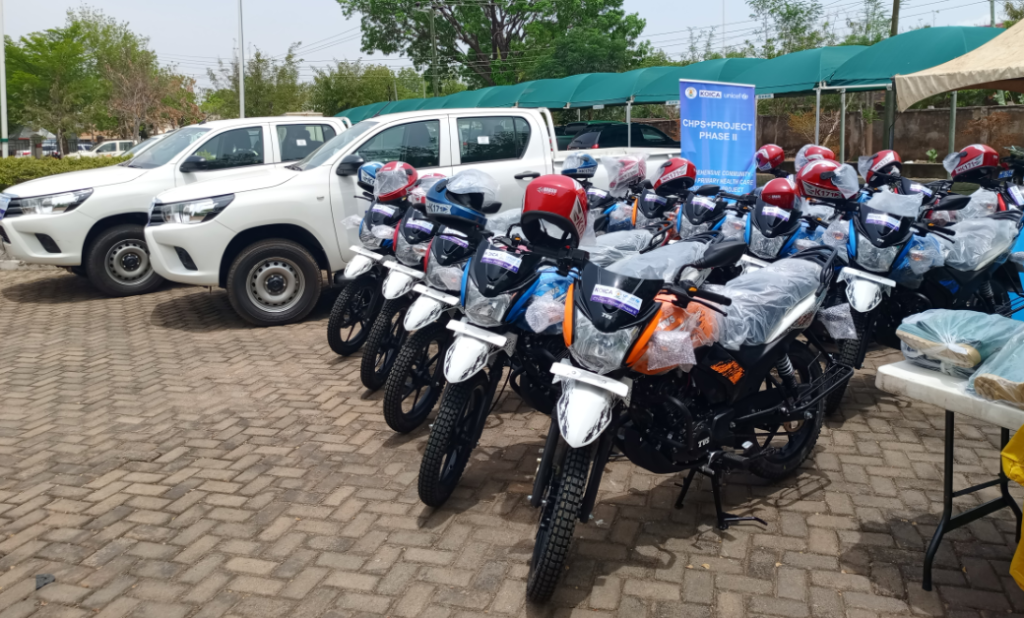By Godfred A. Polkuu, GNA
Bolgatanga, May 31, GNA – The Korea International Cooperation Agency (KOICA), has presented various items to the Ghana Health Service (GHS) in the Upper East to boost health care delivery.
It would especially support the implementation of the KOICA Community-based Health Planning and Services plus (CHPS+) Project Phase II in the region.
The items included pick-up vehicles, wellington boots, bicycles, mobile phones, torchlights, hand washing basins, knapsack sprayers, laptop computers, among several medical equipment for hospitals in the area.
The estimated cost of the items, some of which would be shared to the Service in the North East Region, were valued at GH¢43.5 million.
The gesture was part of phase II of the KOICA CHPS+ project, launched in July 2023 in Nalerigu, the North East Regional capital, after a successful implementation of Phase I in the Upper East region from 2016 to 2020.
The first phase of the project focused on strengthening the region’s health system for primary healthcare delivery.
Phase II of the project, which is for five years to be undertaken in the North East region, is at an estimated cost of US$12million, and would provide continuous support for previously implemented activities in selected CHPS zones in the Upper East region, including previously unsupported communities and health facilities.
Speaking at a ceremony to hand over the items to management of the GHS in the Upper East region, Mr Donghyun Lee, Country Director, KOICA, said his organisation had over the years partnered the GHS to strengthen Ghana’s primary healthcare system.
He said the CHPS project phase II was instrumental in KOICA’s collaboration with the GHS, adding that “The items we are presenting today include logistics, equipment for Community Health Volunteers and motorbikes for Community Health Officers.
“They are specifically chosen to address key challenges related to delivery of healthcare in our communities,” Mr Lee said.
He said the items were provided together with other aspects such as human resource capacity building, infrastructure, and the provision of health equipment as part of a holistic approach that the Korean Government took to ensure quality healthcare services for all Ghanaians, especially in underserved communities.
The Country Director indicated that the success of the CHPS+ project relied heavily on the tireless efforts of Ghana’s healthcare professionals, community leaders and volunteers, “We at KOICA commend your dedication and commitment, which are truly inspiring.”

Mr Bhanu Pathak, UNICEF’s Chief Field Officer, expressed gratitude to KOICA for its generous support and partnership in improving primary healthcare delivery in the Upper East and North East Regions.
He said UNICEF was proud to be part of the KOICA CHPS+ Phase II project, as it provided procurement support and expertise in maternal, child and newborn health to improve the quality of care.
Dr Samuel Kwabena Boakye-Boateng, the Upper East Regional Director of the GHS, who received the items, thanked KOICA for the support over the years, and gave the assurance that the items would be properly used and maintained to achieve the intended purpose.
He said CHPS was a policy and strategy adopted by Ghana in 1999 and had proven over the years to yield the needed outcomes, which was implemented effectively.
“I can confidently say that the Upper East region, having learnt from the Navrongo and the Nkwanta experience, has become a haven for best practices as far as CHPS implementation is concerned,” he said.
Dr Boakye-Boateng noted that several partners had contributed in diverse ways to the success of CHPS in the Region, saying “One such partner that had been with us for the longest of time through thick and thin, and to whom we can easily attribute significant contribution to palpable evidence of successful CHPS implementation in the Upper East Region is KOICA,”
He said KOICA’s contribution to healthcare delivery in the region had significantly improved on key health indicators as the region prided itself of 100 percent functionality of its CHPS zones.
On the region’s performance over the years, the Director said through KOICA’s contribution, institutional maternal mortality ratio reduced from 110.9/100,000 live births in 2016 to 98/100,000 lives births in 2021 and then to 76.7/100,000 live births in 2023.
“Neonatal mortality rate reduced from 6.8/1000 live births in 2016 to 4.9/1000 live births in 2023. Childhood immunization coverage, Ante-Natal Care coverage, Post-Natal Care coverage and percentage skilled delivery saw marked increments,” he added.
GNA